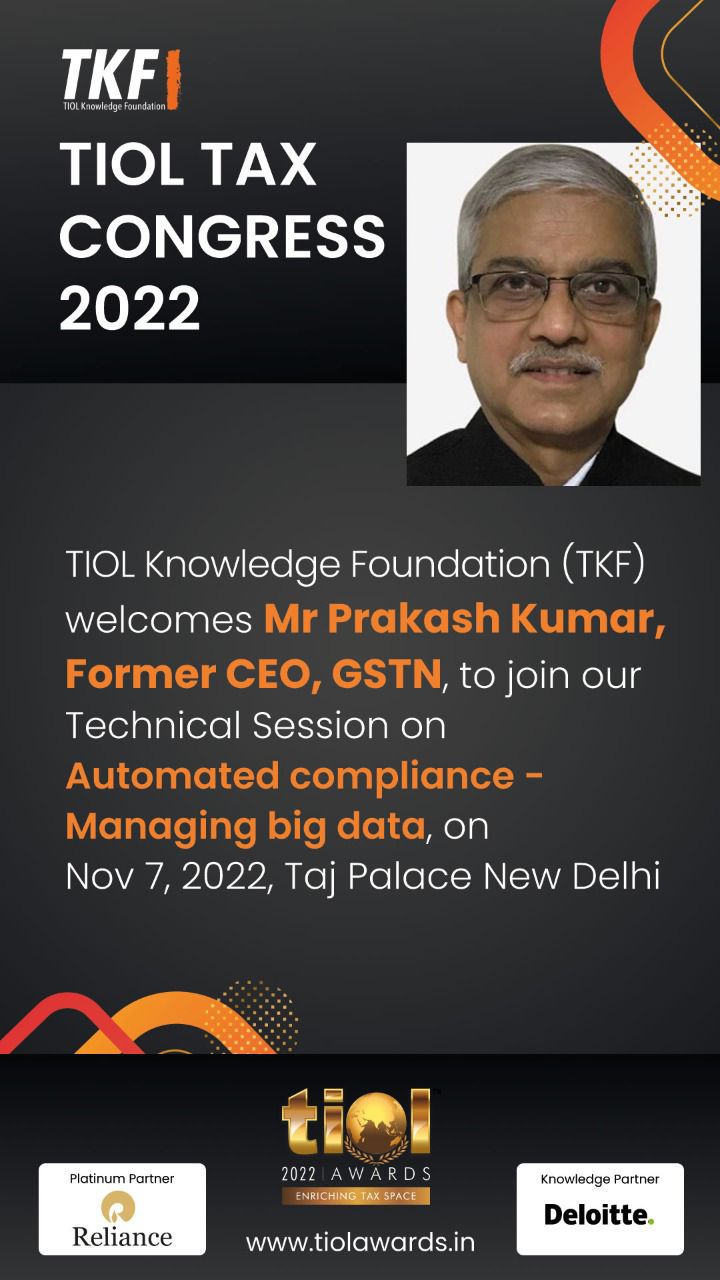2022-TIOL-623-CESTAT-AHM
Nitco Ltd Vs CCE & ST
CX - The issue involved is that the company M/s Nitco Ltd has availed cenvat credit on strength of Bill of entry which is in the name of their other unit located at Kharadpada Silvassa, Gujarat - Since the main company has settled their case under SVLDRs, 2019 no discussion is required to be made for company's case - However, bill of entry is not an invalid document, only lapse on the part of company is that they have taken credit on Bill of Entry whereas the custom duty was paid but same was not in the name of M/s Nitco Ltd - It cannot be said that the present appellant who is an employee of the company has intentionally done any fraud - The issue involved is of interpretation of CCR, 2004 for which company M/s Nitco Ltd, Silli has been demanded the wrongly availed credit and penalty was also imposed - In this nature of case, personal penalty cannot be imposed on employee as credit was not taken on a forged or invalid document but the only lapse was that the bill of entry was not in the name of company but in the name of different location - However, both the company belongs to one entity only even the availment of credit does not amount to double benefit - Personal penalty cannot be imposed on employee - Accordingly, same is set aside: CESTAT
- Appeal allowed: AHMEDABAD CESTAT
2022-TIOL-622-CESTAT-MUM
Supermax Personal Care Pvt Ltd Vs CCE & ST
CX - Appellants had defaulted on payment of duty determine by them for the month of January 2013 - The defaulted amount was paid by them by way of debit entry made by them in their CENVAT credit account on 26.03.2013 - During the period from 07.03.2013 to 26.03.2013, they cleared the goods on payment of duty in cash, consignment wise as provided for by Rule 8(3A) of CER, 2002 - Revenue's contention is that the payment made by appellant by way of debit in his CENVAT Account is not proper discharge of defaulted duty for the month of January 2013 - Since the default continued even after 26.03.2013, appellants were required to pay duty consignment wise for the entire period of default - Accordingly a SCN was issued to appellant - Plain reading of Rule 8(3A) ibid as it was then would clearly show that it is not amenable to Section 11A of CEA, 1944 - Rule itself declares that in cases where the rule apply, clearances are to be made on payment of duty in cash and on consignment basis - In case of default from same the goods will be treated to be cleared without payment of duty and consequences as per law will follow - By making the demand as above nearly one year later, for the clearances made without payment of duty revenue was not only soft pedaling the issue but was permitting the clearance without payment of duty - The natural consequence of clearances made without payment of duty was to seize and confiscate all the goods that were cleared by appellant without payment of duty - Might be revenue mulled over the issue during intervening period as to what would be correct course of action - After permitting the clearances contrary to provisions of Rule 8(3A) ibid revenue authorities cannot subsequently turn back and make demand by invoking provisions of Section 11A ibid - Demand of duty made by revenue for period after 26.03.2013, needs to be set aside - Impugned order is set aside: CESTAT
- Appeal allowed: MUMBAI CESTAT
2022-TIOL-621-CESTAT-MUM
Yenkay Medico Drugs Pvt Ltd Vs CC
Cus - The challenge of appellant to impugned order upholding the recovery of duty foregone on import of 'sodium cyanide' and 'dimethyl urea' against advance licence in accordance with Notification No. 159/90-Cus. ordered by original authority, is limited to interest charged and penalty imposed as duty liability on imported raw materials deployed for manufacturing goods that were, admittedly, cleared into domestic market instead of being exported is accepted by appellant - Interest liability on duty recovered subsequently may be under authority of Customs Act, 1962, the relevant notification issued under section 25 of Customs Act, 1962 for implementing exemption or concession scheme in Foreign Trade Policy or by reference to such authorizing provision of Foreign Trade Policy in said notification; the essence is an authority, direct or remote, attributable to an empowering statute - There can be no doubt that such condition was not in existence at the time of import and SCN is also conspicuously silent on availability of section 28AB of Customs Act, 1962 for such charging - The licence and exemption notification are silent on such contingent charging; the sole provision cited by lower authorities is paragraph 128 of Handbook of Procedures which can hardly be claimed as a statutory prescription of Foreign Trade Policy - It is a beneficial provision that enables a licence-holder to lay claim to regularization for breach of fulfilment of target of export obligation subject to compliance with conditions therein - That is an internal disposal by competent authority under FTDR Act, 1992 – a far cry from proceedings leading to order impugned before – and not applicable to present circumstances - Appellant was not contracted, either directly or indirectly, to be liable for recovery of interest as laid down in re Wipro Ltd (Infotech Group) 2012-TIOL-63-HC-KAR-CUS by High Court of Karnataka - The charging of interest and imposition of penalty is set aside: CESTAT
- Appeal allowed: MUMBAI CESTAT
2022-TIOL-620-CESTAT-KOL
United Custom House Agency Pvt Ltd Vs Pr.CC
Cus - This appeal has been filed by appellant against suspension of their Custom Broker License - The charges against appellant are failure to follow Regulations of CBLR, 2018 - The sealed container was received and appellant had no occasion to come to know about the mis-declaration and therefore, could not have possibly informed the authorities - Impugned order holds that the appellant had never communicated with importer and did not verify the registered address as mentioned in KYC form of importer - It could not be the responsibility of Custom Broker to actually physically verify the address of importers or financial background of importer - Appellants have argued that the responsibility cast on them is to do whatever verification is possible on the basis of documents like IEC Code, GST number, pan number etc. - Next charge on appellant is that he failed to follow Regulation 10(n) of CBLR, 2018 which requires the Custom Broker to verify correctness of Importer Exporter Code IEC number, GSTIN, identity of his client and functioning of his client at the declared address by using reliable, independent, authentic documents, data or information - Impugned order holds that the appellant failed to verify registered address as mentioned in KYC form before taking up the job as Custom Broker for clearance of said import consignment - Appellant has claimed that KYC documents were verified by them on the strength of documents supplied by importer - Impugned order does not accept this defence and still upholds the suspension order - Appellant have done the necessary verification through documents - Significant amount of time is lapsed and whatever inquiry was necessary would have been completed now - No justification found for continuing the suspension any more - Suspension may be lifted with immediate effect: CESTAT
- Appeal allowed: KOLKATA CESTAT
2022-TIOL-619-CESTAT-KOL
Pricewaterhouse Coopers Pvt Ltd Vs Pr.CST
ST - As regards the assessee's appeal assailing demand of short reversal of Cenvat credit by adding value of export of services in total turnover (in the numerator) as per formula given under Rule 6(3A) of CCR, 2004, Adjudicating authority was placing reliance on CBIC's Circular No. 868/8/2008-CX , wherein it was already clarified that the export of services without payment of service tax, are not to be treated as exempted services for the purposes of Rule 6(3) of CCR, 2004 - Assessee submits that, during impugned period, the term 'export of service' was neither defined under the Finance Act nor under CCR, 2004 - Rule 3 of Export of Services Rules, 2005, as applicable during the impugned period, provided for conditions subject to which, taxable services specified under section 65(105) of Finance Act, would be treated as export of services - It is clear that the turnover of 'export of service' represents taxable services only which have been exported - Thus, assessee has not short reversed Cenvat credit under Rule 6(3A) of CCR, 2004 and therefore drop the proceedings to the extent by allowing the appeal filed by assessee: CESTAT
- Assessee's appeal allowed: KOLKATA CESTAT
2022-TIOL-618-CESTAT-DEL
Rajasthan State Road Development Construction Corporation Ltd Vs CCGST
ST - The issue involved is, whether the appellant, a company registered under Section 617 of Companies Act, 1956, a Government Company, 100% shares are held by Rajasthan Government and whether the works contract done by them through their sub-contractor with respect to laying of pipeline for fresh water, whether the same is exempt from service tax under provisions of Notification No. 25/2012-S.T. as amended - Admittedly the appellant company is established by Government of Rajasthan, which owns 100% of equity and further 100% control is in the hands of Government of Rajasthan - Further, the laying of fresh water pipeline is a work entrusted to a municipality under Article 243W of Constitution of India - Accordingly, appellant is entitled to exemption under Notification No. 25/2012-S.T. - Impugned order is set aside: CESTAT
- Appeal allowed: DELHI CESTAT




